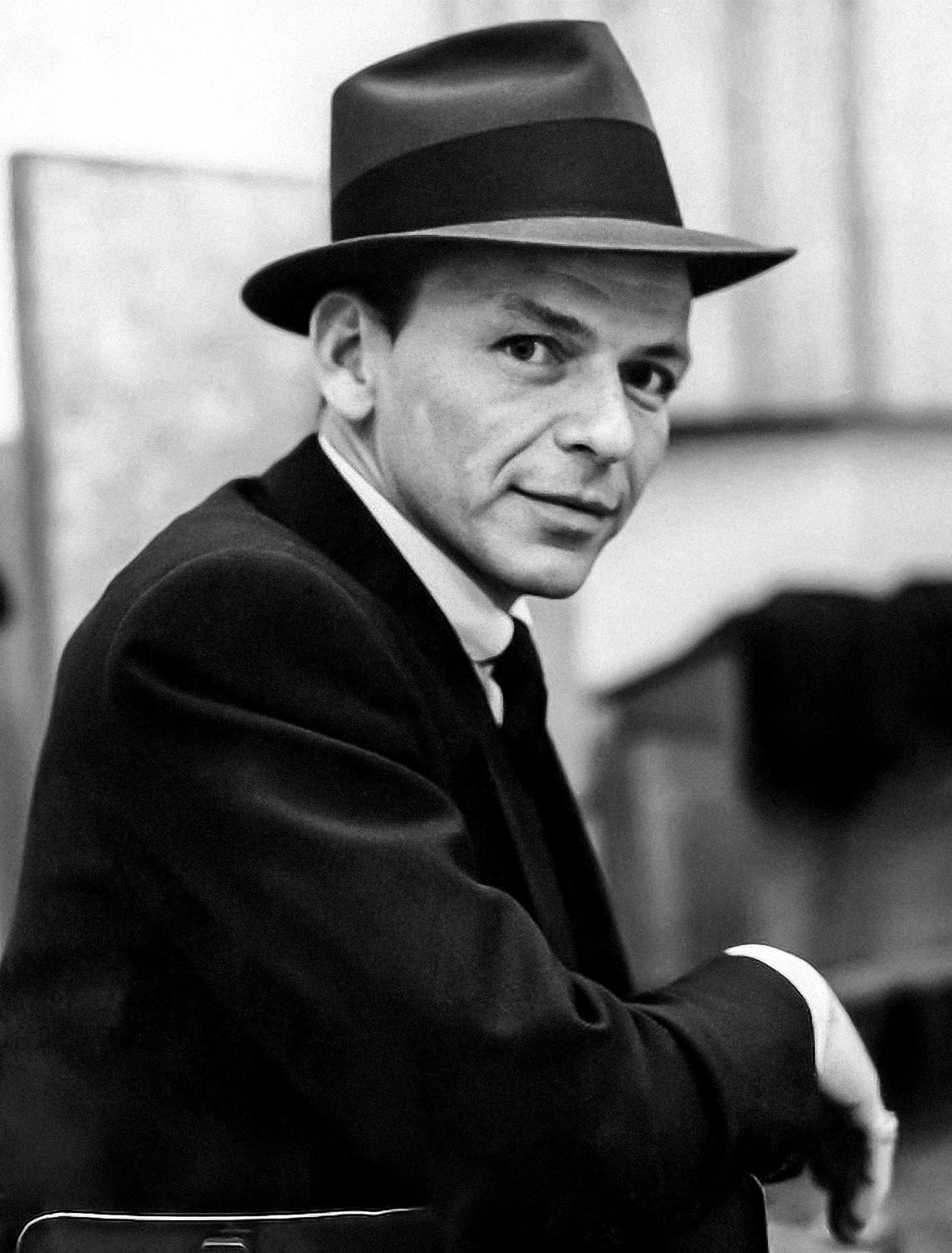
Frank Sinatra
Francis Albert Sinatra (/sɪˈnɑːtrə/; December 12, 1915 – May 14, 1998) was an American singer and actor. Nicknamed the "Chairman of the Board" and later called "Ol' Blue Eyes", he is regarded as one of the most popular entertainers of the mid-20th century. Sinatra is among the world's best-selling music artists, with an estimated 150 million record sales globally.[2][3]
"Sinatra" redirects here. For other uses, see Sinatra (disambiguation).
Frank Sinatra
May 14, 1998 (aged 82)
- Singer
- actor
- producer
1935–1995
Republican (after 1972)[1]
Democratic (until 1972)
Vocals
Born to Italian immigrants in Hoboken, New Jersey, Sinatra began his musical career in the swing era and was greatly influenced by the easy-listening vocal style of Bing Crosby.[4] He found success as a solo artist after signing with Columbia Records in 1943, becoming the idol of the "bobby soxers". In 1946, Sinatra released his debut album, The Voice of Frank Sinatra. He then signed with Capitol Records and released several albums with arrangements by Nelson Riddle, notably In the Wee Small Hours (1955) and Songs for Swingin' Lovers! (1956). In 1960, Sinatra left Capitol Records to start his own record label, Reprise Records, releasing a string of successful albums. He collaborated with Count Basie on Sinatra-Basie: An Historic Musical First (1962) and It Might as Well Be Swing (1964). In 1965, he recorded the retrospective album September of My Years and starred in the Emmy-winning television special Frank Sinatra: A Man and His Music. After releasing Sinatra at the Sands in early 1966, Sinatra recorded one of his most famous collaborations with Tom Jobim, Francis Albert Sinatra & Antonio Carlos Jobim. It was followed by 1968's Francis A. & Edward K. with Duke Ellington. Sinatra retired in 1971 following the release of "My Way", but came out of retirement two years later. He recorded several albums and released "New York, New York" in 1980.
Sinatra forged a highly successful career as a film actor. After winning the Academy Award for Best Supporting Actor for From Here to Eternity (1953), he starred in The Man with the Golden Arm (1955) and The Manchurian Candidate (1962). Sinatra also appeared in musicals such as On the Town (1949), Guys and Dolls (1955), High Society (1956), and Pal Joey (1957), which won him a Golden Globe Award. Toward the end of his career, he frequently played detectives, including the title character in Tony Rome (1967). Sinatra received the Golden Globe Cecil B. DeMille Award in 1971. On television, The Frank Sinatra Show began on CBS in 1950, and he continued to make appearances on television throughout the 1950s and 1960s.
In 1983, Sinatra was honored at the Kennedy Center Honors. He was awarded the Presidential Medal of Freedom in 1985 and the Congressional Gold Medal in 1997. Sinatra received eleven Grammy Awards including the Grammy Trustees Award, Grammy Legend Award, and the Grammy Lifetime Achievement Award. He was included in Time magazine's compilation of the 20th century's 100 most influential people. American music critic Robert Christgau called him "the greatest singer of the 20th century"[5] and he continues to be regarded as an iconic figure.[6]
Film and television portrayals
Sinatra has also been portrayed on numerous occasions in film and television. A television miniseries based on Sinatra's life, titled Sinatra, was aired by CBS in 1992. The series was directed by James Steven Sadwith, who won an Emmy Award for Outstanding Individual Achievement in Directing for a Miniseries or a Special and starred Philip Casnoff as Sinatra. Sinatra was written by Abby Mann and Philip Mastrosimone, and produced by Sinatra's daughter, Tina.[599]
Sinatra has subsequently been portrayed on screen by Ray Liotta (The Rat Pack, 1998),[600] James Russo (Stealing Sinatra, 2003),[601] Dennis Hopper (The Night We Called It a Day, 2003),[602] and Robert Knepper (My Way, 2012),[603] and spoofed by Joe Piscopo and Phil Hartman on Saturday Night Live.[604] A biographical film directed by Martin Scorsese has long been planned.[605] A 1998 episode of the BBC documentary series Arena, The Voice of the Century, focused on Sinatra.[606] Alex Gibney directed a four-part biographical series on Sinatra, All or Nothing at All, for HBO in 2015.[607] A musical tribute was aired on CBS television in December 2015 to mark Sinatra's centenary.[608] Sinatra was also portrayed by Rico Simonini in the 2018 feature film Frank & Ava, which is based on a play by Willard Manus.[609][610] Creed singer Scott Stapp will portray Sinatra in Reagan, a biopic of U.S. President Ronald Reagan.[611] in 2024, Martin Scorsese planned to make film on Sinata and his second wife Ava Gardner [612]
Sinatra was convinced that Johnny Fontane, a mob-associated singer in Mario Puzo's novel The Godfather (1969), was based on his life. Puzo wrote in 1972 that when the author and singer met in Chasen's, Sinatra "started to shout abuse", calling Puzo a "pimp" and threatening physical violence. Francis Ford Coppola, director of the film adaptation, said in the audio commentary that "Obviously Johnny Fontane was inspired by a kind of Frank Sinatra character".[613]